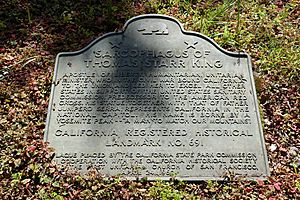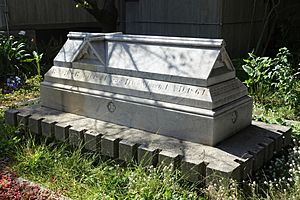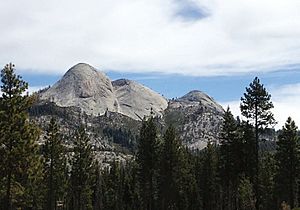Thomas Starr King facts for kids
Quick facts for kids
Thomas Starr King
|
|
|---|---|
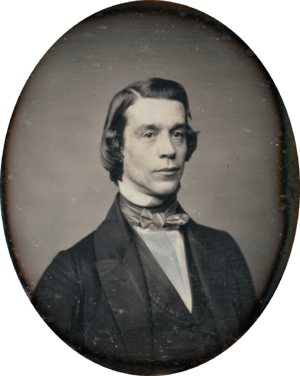 |
|
| Born | December 17, 1824 New York City
|
| Died | March 4, 1864 (aged 39) San Francisco
|
| Occupation | Minister, orator |
| Signature | |
 |
|
Thomas Starr King (December 17, 1824 – March 4, 1864) was an American minister. He was a Universalist and Unitarian preacher. He became very important in California politics during the American Civil War. Many people believe he helped keep California loyal to the United States. Some even called him "the orator who saved the nation."
Contents
Early Life and Learning
Thomas Starr King was born in New York City on December 17, 1824. His father, Rev. Thomas Farrington King, was also a Universalist minister. When Starr King was only 15, his father died. He had to leave school to support his family.
Even though he left school, he kept learning on his own. He was inspired by famous thinkers like Ralph Waldo Emerson. At 20 years old, he became a minister at his father's old church in Charlestown, Massachusetts.
A Career in Preaching and Speaking
In 1849, Starr King became the pastor of the Hollis Street Church in Boston. He quickly became one of the most famous preachers in New England. He was also a popular speaker on the lyceum circuit. This was a series of public lectures given across the country. He traveled all over New England and even as far as Chicago.
Starr King was known as one of the top four lyceum speakers. He gave talks on many topics, including "Substance and Show" and "The Ideal and the Real."
Exploring Nature and Moving West
Starr King loved to visit the White Mountains in New Hampshire. In 1859, he wrote a book about the area called The White Hills; their Legends, Landscapes, & Poetry.
In 1860, he moved to San Francisco to lead the First Unitarian Church. That same year, he visited Yosemite. He was deeply moved by its beauty. He began giving sermons about Yosemite and wrote letters about it. He worked with Frederick Law Olmsted to help make Yosemite a protected area. Yosemite later became a California State Park and then a national park.
Starr King also joined the Freemasons. He became a Master Mason in San Francisco.
Helping the Union During the Civil War
During the Civil War, Starr King strongly supported the Union. Many people, including Abraham Lincoln, believed his speeches helped stop California from becoming a separate country.
He worked with writer Bret Harte. Starr King would read Harte's patriotic poems at his speeches. He also read poems by famous writers like Henry Wadsworth Longfellow. These poems helped inspire Californians to support the Union. Starr King believed it was important to make California more like the Northern states.
Starr King's younger brother, Edward Starr King, was a ship captain. He once said, "Starr has the brains of the family, and I the brawn."
Starr King also helped create the Pacific Branch of the United States Sanitary Commission. This group raised money and medical supplies for wounded soldiers. It was an early version of the American Red Cross. Starr King was a powerful speaker. He raised over $1.5 million for the Sanitary Commission. This was a huge amount of money at the time.
Death and Legacy
Giving so many speeches made Starr King very tired. He died in San Francisco on March 4, 1864. He had diphtheria and pneumonia. He was only 39 years old.
More than 20,000 people attended his funeral. Many friends, including Bret Harte, wrote tributes to him. Starr King was first buried on Geary Street. Now, he is buried at the First Unitarian Church of San Francisco. In the 1940s, most graves in San Francisco were moved outside the city. However, Starr King's grave was one of the very few allowed to stay.
Honors and Memorials
Many places and things are named after Thomas Starr King to honor his memory.
Landmarks
- Two mountains are named after him: Mount Starr King in the White Mountains and Mount Starr King in Yosemite National Park.
- A giant sequoia tree in the Calaveras Grove is also named for him.
Schools
- The Starr King School for the Ministry in Berkeley, California, was named in his honor in 1941.
- Starr King K–8 School in Carmichael, California.
- Starr King Elementary School in Long Beach, California.
- Thomas Starr King Middle School in Los Angeles.
- Starr King Elementary School in San Francisco.
- The Starr King Parent-Child Workshop in Santa Barbara, California.
Churches
- Starr King Unitarian Universalist Church in Hayward, California.
- Starr King Unitarian Universalist Fellowship (SKUUF) in New Hampshire.
Streets
- Starr King Way in San Francisco.
- Starr King Circle in Palo Alto, California.
- Starr King Court in Charlestown, Massachusetts.
Parks
- Starr King Openspace, a park in Potrero Hill, San Francisco.
Buildings
- Starr King Lodge A.F. & A.M., a Masonic lodge founded in 1864 in Salem, Massachusetts.
Statues and Monuments
- A statue of Thomas Starr King is in Golden Gate Park in San Francisco.
- His church, the First Unitarian Church, and his sarcophagus in San Francisco are considered historical monuments.
Statue in California State Capitol
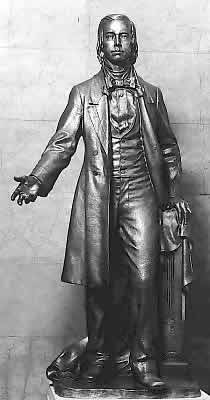
Thomas Starr King was once chosen as one of California's two greatest heroes. A statue of him was placed in the National Statuary Hall Collection in the United States Capitol in Washington, D.C. This was a great honor.
However, in 2006, California decided to replace his statue with one of Ronald Reagan. In November 2009, Starr King's statue was moved. It is now in the Civil War Memorial Grove in Capitol Park, which surrounds the California State Capitol in Sacramento.
Works
- A Vacation Among the Sierras: Yosemite in 1860.
- The White Hills; their Legends, Landscapes, & Poetry. Boston: Crosby, Nichols & Co., 1860.
- Patriotism and Other Papers. Boston: Tompkins, 1864.
- Christianity and Humanity. Boston: Osgood, 1877.
- Substance and Show, and Other Lectures. Boston: Houghton & Osgood, 1877.
 | Ernest Everett Just |
 | Mary Jackson |
 | Emmett Chappelle |
 | Marie Maynard Daly |


